March 10, 2012
by Carole Zangari -
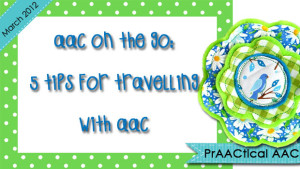
It’s Spring Break here in Florida and that makes us think of traveling. Traveling is never easy, but people who use AAC don’t let that stop them. Here are some tips for making travel easier. – 1. Prepare with a social story. There are some great ones available online, like this one from Autisable (downloadable version here) and . Books and narratives about travelling, such as this one from Kids Can Dream, can also be helpful. Keep the visual element strong by downloading travel brochures for places you will visit, looking at images together, or watching online videos of your destination. – 2. Put it on the (visual) calendar. If you have a monthly or weekly calendar, add symbols to for the trip. Look at the calendar together to talk about it, what you’ll be doing, etc. Doing this repeatedly, can ease the transition into this new territory. Consider doing... [Read More...]
Filed under: PrAACtical Thinking
Tagged With: visual schedule
March 9, 2012
by Robin Parker -
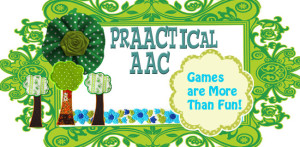
‘Gaming’- not something we typically associate with AAC, but we know that it is often the topic of conversation for kids, teens, and even adults, therefore, it is a topic that goes with AAC. Gaming can have a positive impact on socialization, interaction, communication, and inclusion associated with ‘gaming’. The gaming experience can be a topic of conversation before, during, and after the actual game experience. Gaming can be added to an activity schedule or on a choice board. A mini-schedule can be created to teach the steps to setting up a game, playing the game, or to invite a friend to game. Gaming is part of our pop culture (think Mario Brothers…). So we believe it should be an option if so desired. We would not be thought of as gamers. We have liked games and at times even loved them (think Astroids & Pac-Man), however we have not... [Read More...]
Filed under: PrAACtical Thinking
Tagged With: communication, Gaming, inclusion
March 8, 2012
by Carole Zangari -
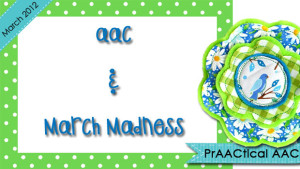
The Ohio Speech-Language-Hearing Association and Cincinnati Children’s Hospital Medical Center worked together to develop Sponsored Silence, a program in which AAC is featured at the half time of basketball games. We love this video from the original event in 2008, but the more recent ones, like this video from 2011, are wonderful, too.
Filed under: PrAACtical Thinking
Tagged With: community, sports
March 7, 2012
by Carole Zangari -
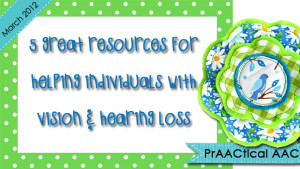
1. National Technical Assistance Consortium for Children and Young Adults Who Are Deaf-Blind: Communication Fact Sheets. – 2. Early Interactions with Children Who are Deafblind by Deborah Gleason – 3. Learning to Communicate: Strategies for Developing Communication with Infants Whose Multiple Disabilities Include Visual Impairment and Hearing Loss by Dr. Deborah Chen, California State University, Northridge – 4. Communicating and Connecting with Learners Who Are Deafblind – Developing Communication Portfolios (Books and Videos) by New England Center Match Maker Project – 5. Tangible Symbol Systems: Making the Right to Communicate a Reality for Individuals with Severe Disabilities by Dr. Charity Rowland and Philip Schweigert –
Filed under: PrAACtical Thinking
Tagged With: hearing impairment, intervention, resources, visual impairment
March 3, 2012
by Robin Parker -
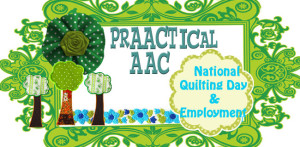
Did you know that March 17, 2012 was National Quilting Day? We didn’t know either until we found out about a great business called Keepsake Quilts. Keepsake Quilts takes your old tee-shirts, those tee-shirts that may have been around for years and are more about the memories then the article of clothing and sews them into a beautiful quilt. And if that isn’t enough to make you love them, it gets even better. This is a nonprofit business with a social mission. The mission is to promote an environment that supports and enhances work skills, interpersonal communication and self-esteem among people who are deaf or hard of hearing. ALl of the employees are deaf or hard of hearing they donate profits to deaf initiatives and deaf youth programs. As we read about the employees, it was interesting to note that a favorite reason for working at Keepsake was that there... [Read More...]
Filed under: PrAACtical Thinking
Tagged With: american sign language, communication, disability, employment, language, quilts
March 2, 2012
by Robin Parker -
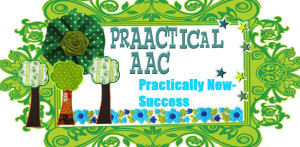
The Secret to Succeeding At Anything We found this very cool photo message through Russ Ewell on google + (re-posted from Robert Nahas) and it really sums up our learning and teaching philosophy. Everyone can improve in their communication, behavior, and organization skills (and anything else). These are some examples of PrAACtically New resources that exemplify the photo message: 5 Examples of Success after Plan A For Employment- Walgreens Rocks For Communication Intervention- Speaking Up Too Late For AAC Apps- 39 Free & Lite AAC Apps For Expectations & Awareness- From Service Dog to SURFice Dog! For Independent Living- hanging with 20 somethings with special needs
Filed under: PrAACtical Thinking
Tagged With: employment, expectations, success, walgreens rocks
February 29, 2012
by Carole Zangari -
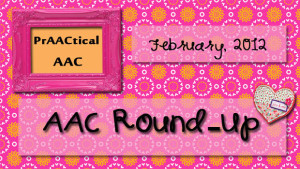
The Fives 5 Features of AAC Apps & SGDs that Make Us Happy 5 Little Things that Make a Big Difference in AAC Intervention 5 Ways SLPs Can Support Friendships for People who Use AAC 5 Ways to Help People With AAC Needs Develop Inner Speech 5 Great Places to Get AAC Therapy Materials 5 Creative Ways to Use the Big Mack and Other Talking Switches 5 Genius Reasons to Discover & Love MeeGenius 5 Quick Wishes for SGDs & Apps 5 Reasons Why A ‘Speech-Only’ Approach Isn’t Good Enough 5 Sources of AAC Inspiration Strategy of the Month: Aided Language Input AACtual Progress: Learning to Use Aided Language Input Using the AAC Device/App: Getting the Team On Board Why We Love Aided Language Input Strategy of the Month: Aided Language Input Video of the Week: Aided Language Input Demo Teachers in Action: Aided Language Input Other Posts Malls &... [Read More...]
Filed under: PrAACtical Thinking
February 29, 2012
by Carole Zangari -
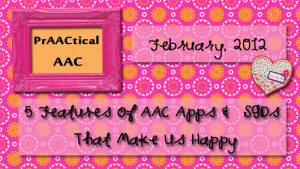
1. Doing a back-up or restore by email? Sounds good to us! Thanks, PictureCanTalk. 2. Allowing people to explore all of the available vocabulary without interfering with the page programming is the AAC equivalent of babbling in the app Speak for Yourself. 3. Ability to turn off the history feature and clear prior communications when privacy is a concern. Noted and appreciated in SonoFlex, Predictable, and other AAC apps/SGDs. 4. Auditory scanning has long been of value in SGDs and now it’s gone mobile. Kids with visual impairment or poor head control appreciate this feature in apps like Sounding Board. 5. Voice morphing: Electronically altering recorded speech. Can’t someone please bring back the awesome vocal aesthetics that were in the Tango? We’re still grieving that loss.
Filed under: PrAACtical Thinking
Tagged With: Apps, SGD
February 25, 2012
by Robin Parker -
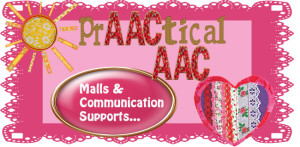
I was in the mall with my teenage daughter yesterday (because that is her favorite place to go) and we saw a group of adults with developmental disabilities. Some of the group members were in wheelchairs and others walked. It appeared that they were on a ‘field trip’ or community outing. My daughter has been ‘working’ with me since she participated as a ‘typical’ peer for various pragmatic groups while she was in preschool. She has been known to regularly (and not always so quietly) identify people who I must know since “they probably go to my clinic”. This would occur even if we were nowhere close to the geographical location of ‘my’ clinic. She has been known to find people who probably need my services so I can help them ‘talk better’. Although my daughter seems to be doing a lot of identifying without any formal training, I have to... [Read More...]
Filed under: PrAACtical Thinking
Tagged With: visual supports
February 24, 2012
by Carole Zangari -
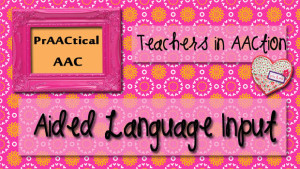
We love people who take a chance and put themselves out there to learn and grow. This video of teacher Amy Powell, who had 2 hours of Minspeak instruction before her “friends” caught her on video, gets a double thumbs up from us. Using the Smart Board to Model AAC for the learners is a great way to make learning big and real. Direct link to video: https://www.youtube.com/watch?v=XQmWw3GprW8&feature=related
Filed under: PrAACtical Thinking
Tagged With: aided language input, schools









